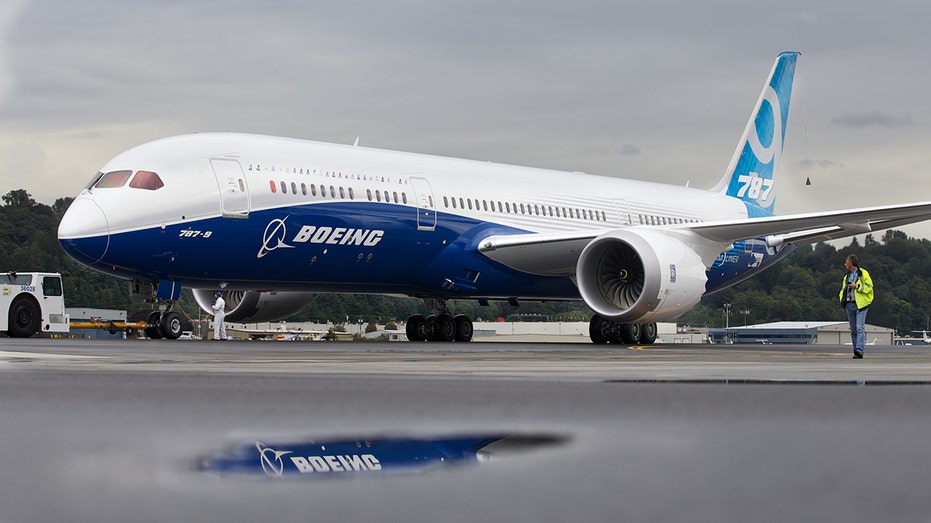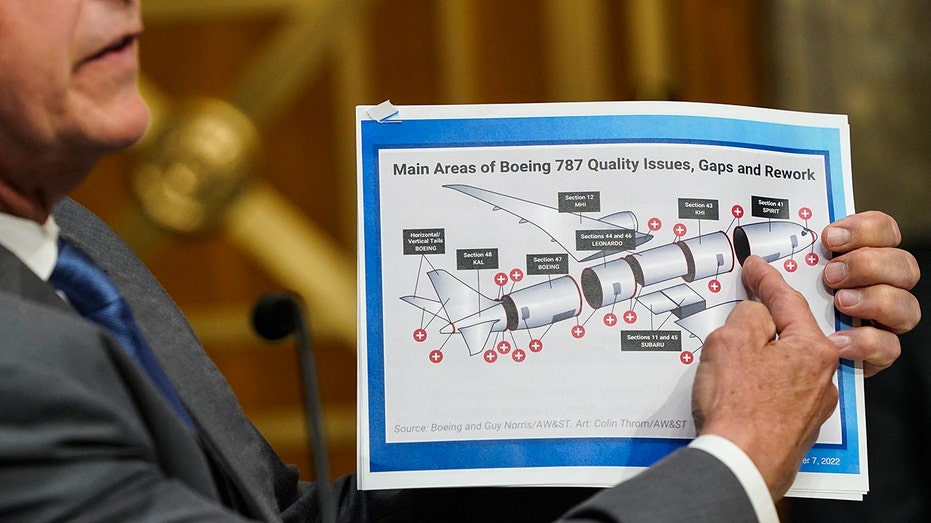Whistleblower testifies Boeing is producing defective planes, says he's received physical threats
Sam Salehpour, a quality engineer at Boeing, claims he's faced retaliation for raising safety concerns about the 787 and 777 aircraft
Whistleblower tells senator Boeing planes are unsafe, claims his superiors made threats over complaints
Sam Salehpour, an engineer at Boeing, told lawmakers that the company is cutting corners in assembling its 787 and 777 jets and claimed his supervisors have retaliated against him for blowing the whistle. (Senator Hawley Press Office)
A whistleblower with more than 40 years of engineering experience told members of the Senate that Boeing is putting out defective airplanes in testimony on Wednesday.
Sam Salehpour, a quality engineer at Boeing, said he came before lawmakers at great professional risk to detail his concerns about the safety of Boeing's 787 and 777 aircraft. He claims that Boeing has rushed production of these jets and overlooked safety standards, which Salehpour says may cause a devastating failure in the future.
"Effectively, they are putting out defective airplanes, respectively," Salehpour said in his testimony to the investigative subcommittee of the Senate Homeland Security and Governmental Affairs Committee.
| Ticker | Security | Last | Change | Change % |
|---|---|---|---|---|
| BA | THE BOEING CO. | 243.03 | +6.08 | +2.57% |
Salehpour has claimed that Boeing failed to adequately shim, or use a thin piece of material to fill tiny gaps in a manufactured product, an omission that could cause premature fatigue failure over time in some areas of the Boeing 787 Dreamliner.
BOEING WHISTLEBLOWER RAISES CONCERNS OVER SAFETY OF 787 DREAMLINER JETS

Boeing engineer Sam Salehpour arrives for a Senate Homeland Security and Governmental Affairs subcommittee on investigations hearing titled "Boeing's broken safety culture, focusing on firsthand accounts" at the U.S. Capitol in Washington, D.C., on W (Kent Nishimura/Getty Images / Getty Images)
He explained that Boeing's standards require gaps to be filled when they exceed five thousandths of an inch.
"This seems very small. Boeing's PR team like to call it the weight of a human hair. When you are operating at 35,000 ft., details that are the size of a human hair can be a matter of life and death," Salehpour said.
Boeing has challenged Salehpour's claims against two of its widebody jets, the 787 and 777, which fly internationally. Boeing said on Monday it has not found fatigue cracks on in-service 787 jets that have gone through heavy maintenance.
In a statement to Reuters on Wednesday, Boeing defended the safety of its aircraft, arguing that the global 787 fleet has transported more than 850 million passengers safely, while the 777 has safely flown more than 3.9 billion travelers.

A Boeing 787-9 Dreamliner taxis at Boeing Field in Seattle after concluding its first flight on Sept. 17, 2013. (Stephen Brashear/Getty Images / Getty Images)
Salehpour testified that he raised safety concerns with Boeing over the course of three years but had been ignored. He described retaliation by his supervisors, including being transferred out of the 787 program into the 777 program and even alleged physical threats made against him.
"I was told not to create, not to create delays," he said. "I was told, frankly, to shut up."
Salehpour described an exchange with his direct supervisor in which he was allegedly threatened after bringing his concerns up in a meeting.
"My boss said, ‘I would have killed someone who said what you said in a meeting,’" he testified. "This is not safety culture when you get threatened by bringing issues of safety concerns."
BOEING'S TIP LINE SUBMISSIONS WERE UP 500% ON THE YEAR DURING THE FIRST QUARTER

Sen Roger Marshall, R-Kan., holds up a graphic illustrating quality issues with Boeing 787 planes during a Senate Homeland Security and Governmental Affairs Subcommittee on Investigations hearing in Washington, D.C., on Wednesday. (Drew Angerer/AFP via Getty Images / Getty Images)
Boeing did not immediately respond to a request for comment about Salehpour's allegations of retaliation.
Salehpour's testimony comes as Boeing — which recently overhauled its leadership team — continues to deal with fallout stemming from the plug-in door that blew off an Alaska Airlines flight in January.
GET FOX BUSINESS ON THE GO BY CLICKING HERE
Boeing previously told FOX Business that the "claims about the structural integrity of the 787 are inaccurate" and that the "issues raised have been subject to rigorous engineering examination under the FAA oversight."
"This analysis has validated that these issues do not present any safety concerns and the aircraft will maintain its service life over several decades," Boeing said, adding that it will "continue to monitor these issues under established regulatory protocols and encourage all employees to speak up when issues arise. Retaliation is strictly prohibited at Boeing."
FOX Business' Daniella Genovese and Timothy Nerozzi and Reuters contributed to this report.





















